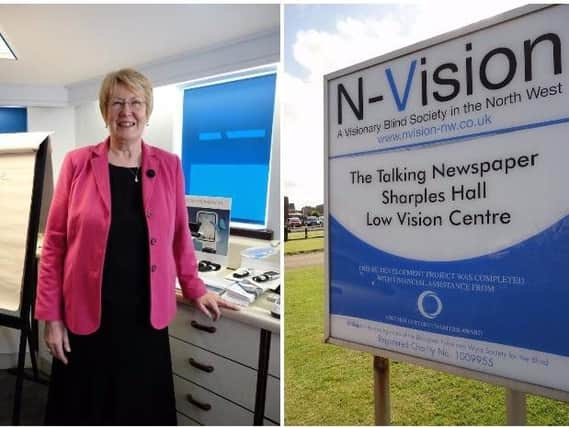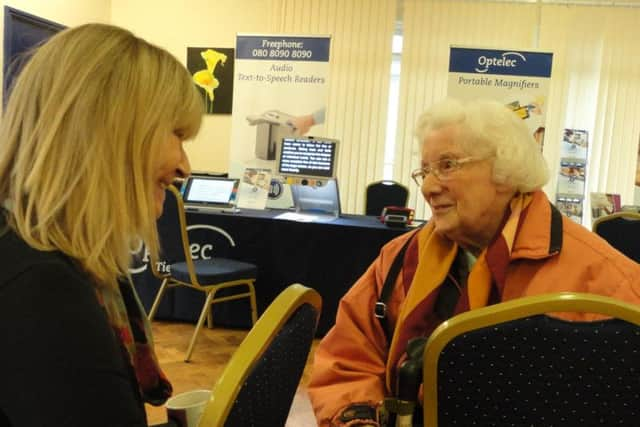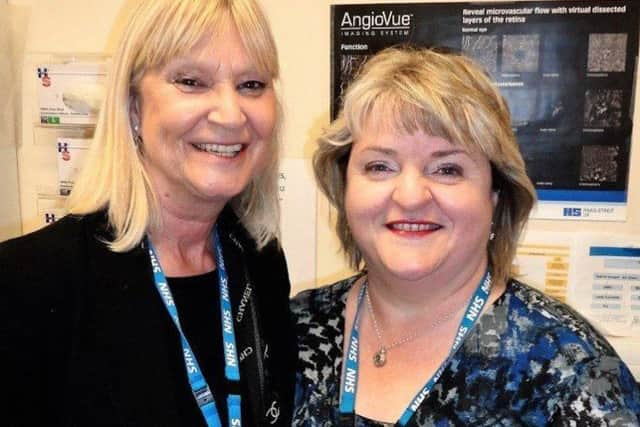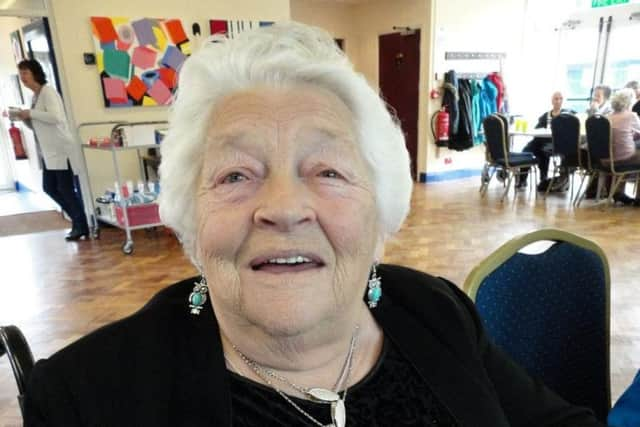'˜I wish I'd listened when my doctor warned me'


Look after your sight – before it’s too late.
That’s the message from Fylde coast charity N-Vision, warning one in two cases of sight loss is preventable.
It is a condition that affects more than 2m people in the UK and the charity is working to help bring the figure down and help those affected on the Fylde coast.


Advertisement
Hide AdAdvertisement
Hide AdAs national eye health week comes to a close, N-Vision aims to encourage people to look after their sight all year round.
Having regular eye tests, eating your greens, cutting down on the booze, packing in the cigarettes and getting more exercise can all help.
N-Vision, the Blackpool Fylde and Wyre Society for the Blind, is part of the Lancashire Eye Health Network which brings together sight loss charities, hospital ophthalmologists, high street optometrists and other agencies concerned about eye health.
Judith Harrison, N-Vision’s community services manager and representative of the LEHN, explains: “The group wants to get the message out about how important it is to have regular sight tests in the hope of eliminating avoidable sight loss.”


Advertisement
Hide AdAdvertisement
Hide AdArguably, that’s best achieved by talking to those registered as blind or severely sight impaired– 96 per cent of whom still have some sight. It’s a lesson in perspective – and in reminding others just what’s at stake.
Joyce O’Callaghan, 77, one of N-Vision’s 2,200 clients, confesses: “I’ve been coming here for 15 years.
“I wish I’d listened to my doctor when he warned me that I could lose my sight.
“But I preferred my treats. I was a chocoholic. If I could change things, I would.”


Advertisement
Hide AdAdvertisement
Hide AdAnne Walmsley, 85, who has macular degeneration, admits: “I miss sewing. I used to sew every day. But it’s surprising how you cope. I’d urge others to come here and get help, get advice.”
Mary Hunter, 88, of Blackpool, says: “I had a detached retina and then macular degeneration started six years ago. I used to play cards competitively. I’m a poor loser.”
Tom Critchley, 73, a regular at N-Vision with wife Carol for 20 years, lost his sight to retinal detachment and glaucoma.
“I don’t want sympathy, just understanding,” he adds. “It’s not a total disaster. Get to the opticians, stay active, look after yourself.”


Jeff Crozier of Lytham lost his sight to a stroke.
Advertisement
Hide AdAdvertisement
Hide Ad“I was on the motorway, got lost, came off, had a stroke,” he said.
“Another stroke in hospital damaged the optic nerve. I lost my sight in seconds. Everything is blurred but I still play golf and my wife Gwen is the best carer.
“My advice to others is never say ‘used to’ and never say ‘can’t’.”
Jean Hancock, who’s in her late 70s, lost her sight to polio – at 17.
Advertisement
Hide AdAdvertisement
Hide Ad“It affected the optic nerve,” she said. “After that I got glaucoma, then two years ago cataracts. Everything’s a blur.”


Community services manager Judith adds: “One in five people aged 75 and one in two aged 90 and over live with sight loss – and nearly two thirds are women.
“Almost two thirds of sight loss in older people is caused by refractive error or cataract and both can be detected by a simple eye test and in most cases corrected.
“Macular degeneration affects so many of our clients – it’s the commonest cause of sight loss in the over 60s.
Advertisement
Hide AdAdvertisement
Hide Ad“The macular is a tiny part of the retina but responsible for central vision used for reading, watching telly, seeing the dials on cookers, the smile on a loved one’s face.”
But one of N-Vision’s younger clients Rose Thorley, 54, reveals: “I’ve no sight in my right eye and about a third in the left. I haven’t the foggiest idea why.
“It was my children who got me here. My daughters are 30 and 25. They saved me, really. I’m a different person today because of this place.”
Dr Sheila Kelleher works on macular assessment clinics, laser clinics, diabetes and carries out intravitreal injections to help absorb fluid leaking out at the back of the eye.
Advertisement
Hide AdAdvertisement
Hide AdShe says: “We’re firefighting the whole time, monitoring and treating fluctuating conditions, operating, curing, or looking at longer term treatments.
“Ageing can’t be stopped, but smoking can – and that can make a huge difference to eye health. I’d love to see fruit and vegetables subsidised too so that people could afford to eat healthier younger.”
Linda’s top tips for eye health
Linda Sethi, N-Vision’s specialist eye clinic liaison officer, offers tips for better eye health.
“Eat lots of broad leaf greens, such as spinach and kale,” she says. “Also broccoli, carrots, orange sweet peppers and corn along with oily fish such as tuna and salmon.
Advertisement
Hide AdAdvertisement
Hide Ad“Smokers are much more likely to develop age-related macular degeneration and cataracts compared with non-smokers.
“Excessive drinking can lead to serious health conditions that have a detrimental effect on your eyes. Exercise may reduce the risk of sight loss which can occur because of high blood pressure, diabetes and narrowing and hardening of the arteries.
“Also remember to protect your eyes from harmful UV rays by wearing good quality sunglasses or a wide brimmed hat.
“Optometrists recommend an eye test every two years – even if you think your vision is fine.
Advertisement
Hide AdAdvertisement
Hide Ad“Eye tests are quick and easy and for a lot of people, including children and over-60s, free on the NHS. If anyone is experiencing difficulties with sight loss, N-Vision is here to offer support and information. Call us on (01253) 362696.”